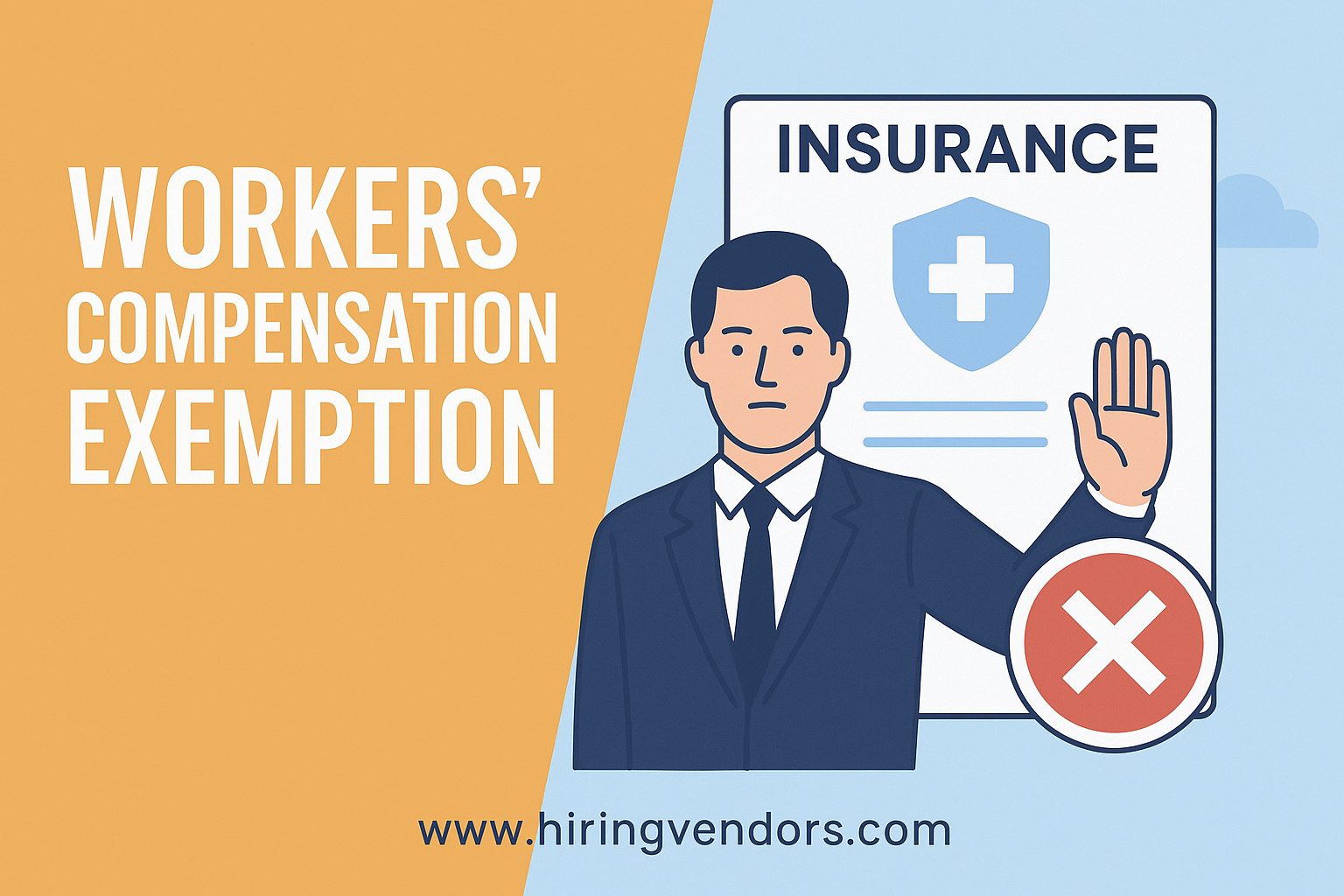
Workers Compensation Exemption: What You Need to Know
Workers’ compensation insurance is a very critical layer of protection for employees and businesses alike, especially in labor-intensive industries such as property preservation and real estate maintenance companies. However, in certain cases, business owners may hold a workers compensation exemption, which can reduce company costs without violating state laws.
If you’re a contractor/vendor, small business owner, or operate your business within the property preservation or real estate industry, this in-depth guide will answer all your questions about workers’ compensation exemption, such as how it works, who qualifies, how to apply, the benefits, and the potential risks involved.
Explore This Article
ToggleWhat is Workers Compensation Exemption?
A workers’ compensation exemption is a legal filing document that allows a business owner to opt out of workers’ comp insurance for themselves, in short it helps to avoid taking Workers’ Compensation Policy. In most U.S. states, business owners like sole proprietors, LLC members, or corporate officers can elect to waive coverage for themselves while still being required to carry it for any employees or vendors / contractors they hire.
This exemption does not mean the business / LLC is completely free from workers’ comp obligations. Instead, it only applies to the owners and doesn’t extend to other workers or contractors / vendors. You must still comply with state laws and client requirements when hiring anyone for your business.
How Does Workers Compensation Exemption Work?
When a business owner files for a workers’ compensation exemption, they are legally declaring the following status:
- They are not an employee of their business or they don’t have any employees.
- They do not wish to receive workers’ compensation insurance benefits for themselves.
- They are aware of the risks involved in working without this insurance policy.
The exemption generally applies only to the individual filing it, not to other business partners, employees, or subcontractors / vendors. In the event of any injury, the exempt individual is not eligible for wage loss benefits or medical coverage under workers’ comp. Instead, they may rely on health insurance, disability insurance, or personal savings due to not having the policy.
Some states require the exemption to be renewed annually or when certain business conditions change anytime (e.g., hiring employees, changing entity structure).
👉 Read Here: Best Property Preservation Companies in the USA

How to Get a Workers Compensation Exemption?
1. Determine Your Eligibility
2. Complete the Required Form
3. Need to Pay the Filing Fee (if applicable)
Some states require a processing fee (typically $50–$100). Others offer the exemption for free
4. Keep a Copy of the Certificate
After your exemption is approved, you will receive a certificate (often a PDF). This document proves to clients, state agencies, and inspectors that you are exempt from Worker’s Compensation Insurance.
5. Renew as Required
What Businesses Are Eligible for Workers Compensation Exemption?
Eligibility for exemption depends largely on the business structures and the state where you operate. Some examples:
Eligible:
- Property preservation vendors operating solo
- Real estate contractors with no employees
- Handymen or field service providers running sole proprietorships
- Single-member LLCs or partnerships without payroll staff
Not Eligible:
- Businesses with W-2 employees
- Companies that hire day laborers or subcontractors without insurance
Firms that are contractually required to carry workers’ comp (even if no employees)

Benefits of Workers Compensation Exemption
1. Cost Savings/minimization
This is the biggest reason most solo operators look for an exemption. Workers’ compensation premiums can be expensive, especially in physical jobs like trash-outs, cleanouts, or lawn maintenance.
2. Simple Compliance
For small businesses that meet the exemption criteria, this is a way to comply with state law without paying for unnecessary coverage.
3. Faster Startup
New businesses can start working immediately without waiting for insurance approvals or paying upfront policy premiums.
4. Ideal for Low-Risk Roles
If you perform administrative or supervisory tasks and rarely visit job sites, exemption may make practical and financial sense.
Risks and Downsides of Workers Compensation Exemption
1. No Coverage for Injuries
If you’re injured on the job, you won’t receive wage replacement or medical care from workers’ comp. You’ll need to rely on personal health insurance or savings.
2. Lost Job Opportunities
Many large clients (banks, asset managers, government contractors, corporate, national) require active workers’ comp coverage, regardless of exemption. You may lose bids without it.
3. Liability Exposure
Even if you’re exempt, your business could still be sued if a job site accident involves others. A general liability policy helps, but it doesn’t cover your own injuries.
4. Complex Compliance
In some states treat subcontractors as employees in audits. If you hire help without proper coverage or misclassify workers, you risk fines and back premiums.
5. Health Insurance Isn't Enough
Many mistakenly think health insurance will cover work injuries – but many personal plans exclude job-related accidents.
Are you looking for a trusted Property Preservation Vendor or Company?
👉 Find verified professionals for cleanup, repairs, and maintenance now.
Best Practices for Exempt Businesses
Should You File for Workers Compensation Exemption?
Workers’ compensation exemption is a smart, legal, and cost-effective move for many small business owners — especially in the property preservation and real estate service industries. But it also comes with serious responsibilities and risks.
If you’re working solo and just getting started, exemption could be a way to reduce expenses. But if you plan to grow, work with subcontractors, or land contracts with large clients, full coverage might serve you better in the long run.
Always consult your state guidelines and talk to an insurance advisor before filing for exemption.
Need help getting compliant and winning more jobs? Join HiringVendors.com to connect with real estate clients, learn business best practices, and grow with confidence.










![Looking for CONTRACTORS in NY [Commercial, Residential & Property Preservation]](https://hiringvendors.com/wp-content/uploads/2025/11/BPC-LOGO-1-100x100.jpg)
![Looking for CONTRACTORS in FL & AL [Commercial, Residential & Property Preservation]](https://hiringvendors.com/wp-content/uploads/2025/11/BPC-LOGO-100x100.jpg)
